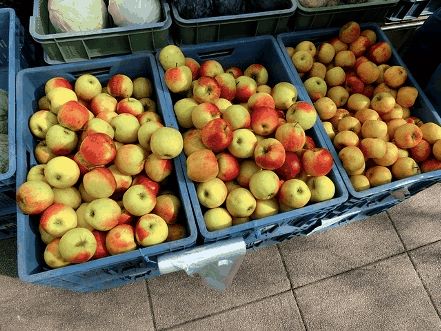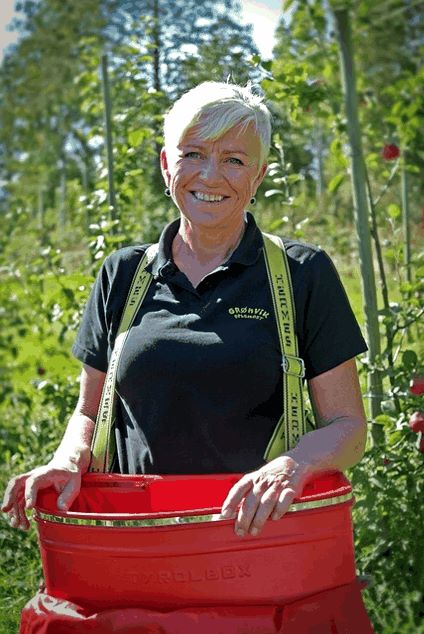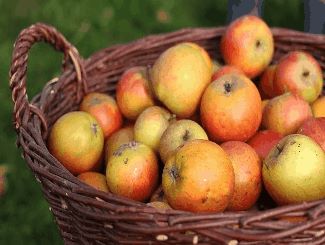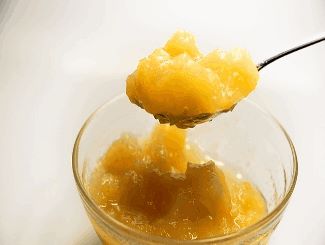|
We take a bite out of a juicy topic this month: apple.
Few fruits are as universally recognized as the apple. These handy fruits can be eaten directly from the tree, cooked along with meat for extra seasoning, or mashed into a sweet "sauce" for dessert. The juice is very sweet, and is imbibed in its normal state, or, when mixed with the pulp of the fruit, as cider. The apple even plays a role in mythology, from the "knowledge fruit" of the Biblical Garden of Eden to the Apple of Discord, which started the Trojan War. There is even a computer company that took the name "Apple" to represent them, and mentioning it to some computer users may be creating your own discord.
 Person pouring apple slices into a tray to make a pie Apples, the fruit kind, vary widely in size, shape, colour, and acidity. Most are round and some shade of red or yellow. The largest producers of apples are the U.S., China, France, Italy, and Turkey. Apples provide vitamins A and C, carbohydrates, and fibre.
All of the European languages, except the Romance languages, (meaning most of the Indo-European languages, including the Celtic languages) use a word with a root of "ap", "ab", "af", "ep", or "av" for apples and apple trees. That can be seen in the English (apple), Old English (aeppel), Celtic (aballo), Irish Gaelic (abhal), Welsh (afal), Icelandic (epli), Russian (яблоко - jabloko), and Polish (jablko). This comes from the Proto Indo-European "ab(e)l", with the changes being made in the various languages due to pronunciation standards. Originally, this term applied to all fruits, which might help explain why the apple was the biblical "fruit of knowledge". It wasn't because the apple was anything specific, but rather the word was used to represent any fruit.
Before Christianity became the official religion of the Roman Empire (4th century AD), the Latin "malum" meant "apple". Once Christianity took over, because of its symbolic importance in the Bible, the term "pomum", meaning "fruit" was used to refer to the apple as the "fruit of fruits". From this "pomum", we get the French (pomme), Catalan (poma), and Walloon (peme).
 Apple strudel for breakfast The Italian word "mela" comes from the Latin "mila", which is the plural of "milum", and this replaces the Classical Latin "malum". "Malum" could come "mala matiana". The "matiana" would be from the adjective matianus, referring to Caius Matius, who was an important author of agricultural treaties.
There is also speculation that the "Matius" comes from another of Caesar's friends, who had written a cookbook. It could also come from the adjective mattianus, referring to the Germanic city of Mattium. Thus, "mala matiana" would be Matius' apple, or Mattium apple. "Malum" is also the source for the Romanian (măr), the Spanish (manzana), and the Portuguese (maçã).
Following these, we can see the Quechua "mansana" is taken from the Spanish, and the Guarani "masã" is either borrowed from the Portuguese, or taken from the Spanish and simplified. Tetum "masán" and Tagalog "mansanas" are probably borrowed from Portuguese.
 Bins of apples on sale at a market The Greek "μήλο" [milo] comes straight from Classical Greek "μῆλον" (μήλον) [melon], "an apple" or, generally, "any tree-fruit". This may also be another source of the Latin "mila", and this shows just how much etymologies are largely speculative. We can observe patterns, but not be sure what influenced what.
One such observation is that Faroese for apple is "súrepli" and potato is "epli", which would seem to contradict the earlier statement about the "ep" root. The prefix "súr-" comes from the adjective "súrur", meaning "sour". This may once again be related to "epli" having a larger meaning, but being reduced later to refer to a single fruit. In this case, it was affixed to potato, and the "súr-" was used to differentiate the apple.
Further evidence of this can be see when looking at the names of some other foods in other languages. A reference to "apple" is often hidden in other names. In old English, the world for "cucumbers" was "eorþæppla" (earth-apples). In French, we find "pomme de terre" (earth-apple) referring to "potato". In English, there is "pineapple", which is a reference to the way the fruit resembles the cones of pine trees.
 Chocolate covered apples on sticks. Yum! There are even more examples of this. Chinese 苹果 / 蘋果 is composed of "apple" and "fruit". Korean 沙果 is composed of "sand (-like), granulated" and "fruit". Japanese りんご [ringo] can be written as 林檎, but that's rarely done in modern Japanese. That is a composition of "forest" and the name of a small type of apple. It seems that 林檎 in Chinese can mean "wedding gift". Vietnamese is "quả táo", which seems to follow the same model of the Chinese variants and the Korean word (just reversed, following Vietnamese grammar):
quả : fruit (old, "fruit")
táo: apple (possibly old, "jujube", "Chinese date")
Sámi has both "ebel" and "eappel". The first seems to be from Baltic, the second from Germanic. Since both Baltic and Germanic take their roots from the same source, this might show how words get altered over time. It would appear both versions of the word remain active in Sámi.
Idioms
 Apple farmer in Norway There are a few idioms in English that involve apples. "In apple-pie order" means "neat and tidy". The term "apple-pie" itself is often used to refer to the "goodness" of America, as in "as American as apple-pie". The "apple of one's eye" refers to a person or item that is held in the highest regard. When you compare two things incorrectly, you are "comparing apples to oranges".
British slang has the cockney rhyming schemes to refer to things, and one is "apples and pears" meaning "stairs". When one "upsets the apple cart", it means carefully made plans are disrupted. Perhaps the most commonly heard usage, however, is "the Big Apple", referring to New York.
Conclusion
However you slice them, apples are delicious and healthy, as well as interesting from a linguistic point of view. An English idiom promotes them with "An apple a day keeps the doctor away." so munch on them as often as you can, and think about how if it wasn't for apples, Sir Isaac Newton would never have discovered gravity, and how fruitless our world would be without that!
| 






























